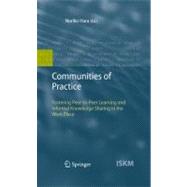
| Introduction | p. 1 |
| Introduction | p. 1 |
| ICT Use to Support Learning | p. 2 |
| Communities of Practice | p. 2 |
| The Fieldwork | p. 5 |
| The Plan of this Book | p. 6 |
| Theoretical Foundation | p. 7 |
| Introduction | p. 7 |
| Research in Cognate Areas Relevant to the Topic | p. 8 |
| Situated Cognition | p. 8 |
| Organizational Learning | p. 9 |
| Communities of Practice | p. 11 |
| Knowledge Management | p. 16 |
| Information and Communication Technologies | p. 21 |
| Summary of What is Known and Unknown | p. 22 |
| Ethnographic Accounts of a Community of Practice in Square County | p. 25 |
| Public Defenders | p. 25 |
| Site Description | p. 26 |
| What it is like to be a Public Defender | p. 28 |
| Public Defenders' Daily Practices | p. 28 |
| Nature of Public Defenders' Job | p. 32 |
| Two Public Defenders' Trials | p. 33 |
| Alisha's Trial | p. 34 |
| Nick's Trial | p. 39 |
| Comparison of Two Trials (Commentary) | p. 44 |
| Characteristics of a Community of Practice in Square County | p. 47 |
| Introduction | p. 47 |
| Autonomous Learners: Striving to Become Better Public Defenders | p. 49 |
| Formal and Informal Learning Opportunities | p. 51 |
| Practical Knowledge versus Book Knowledge | p. 53 |
| Collective Knowledge Building | p. 56 |
| Professional Pride | p. 60 |
| Adversity | p. 62 |
| Client (Dis)Satisfaction | p. 63 |
| Criteria for Success | p. 67 |
| Commentary | p. 70 |
| Individualized Work Style and Personality | p. 70 |
| Unique Culture of the Office | p. 73 |
| Supportive Culture | p. 73 |
| Leadership and Autonomy | p. 75 |
| Reality of the Supportive Culture | p. 77 |
| Commentary | p. 77 |
| Communities of Practice and Information Technologies in the Circle County Public Defender's Office | p. 79 |
| Site Description | p. 80 |
| IT as Support for Practice in the Circle County Public Defender's Office | p. 81 |
| Differences between Younger Attorneys and Experienced Attorneys | p. 83 |
| Younger Attorneys, Communities of Practice, and IT Support of Identity Formation | p. 85 |
| Younger Attorneys in Communities of Practice | p. 85 |
| Isolation, Overload, and Work Specialization | p. 88 |
| Professional Identity among Younger Attorneys | p. 90 |
| Younger Attorneys' Heavy Reliance on IT | p. 91 |
| IT Supports Practice, but Not Identity Formation | p. 92 |
| Commentary | p. 93 |
| Online Communities of Practice: Beyond Organizational Boundaries | p. 95 |
| Online Community of Practice among Public Defenders | p. 95 |
| Online Communities of Practice for Other Professions | p. 99 |
| Sites Descriptions | p. 99 |
| Types of Knowledge | p. 100 |
| Types of Knowledge Shared in Online Communities of Practice | p. 101 |
| What Makes Knowledge Sharing Sustainable in Online Communities of Practice? | p. 104 |
| Relationships Among the Six Factors | p. 108 |
| Commentary | p. 109 |
| Toward an Understanding of Communities of Practice | p. 113 |
| Characteristics of Communities of Practice | p. 113 |
| Social Construction of Knowledge in Communities of Practice: Three Kinds of Knowledge | p. 113 |
| Why it Does Not Support Identity Formation | p. 116 |
| Professional Socialization and Identity | p. 116 |
| Organizational Learning and Communities of Practice | p. 117 |
| Communities of Practice & IT Integration | p. 119 |
| Differences between Online and Face-to-Face Communities of Practice | p. 120 |
| Implications of this Study for Further Research and Development | p. 121 |
| Implications for Education | p. 121 |
| Implications for Information Science | p. 121 |
| Implications for Communities of Practice | p. 122 |
| Epilogue | p. 123 |
| Cast of Characters | p. 125 |
| Types of Activities | p. 127 |
| References | p. 129 |
| Table of Contents provided by Ingram. All Rights Reserved. |
The New copy of this book will include any supplemental materials advertised. Please check the title of the book to determine if it should include any access cards, study guides, lab manuals, CDs, etc.
The Used, Rental and eBook copies of this book are not guaranteed to include any supplemental materials. Typically, only the book itself is included. This is true even if the title states it includes any access cards, study guides, lab manuals, CDs, etc.